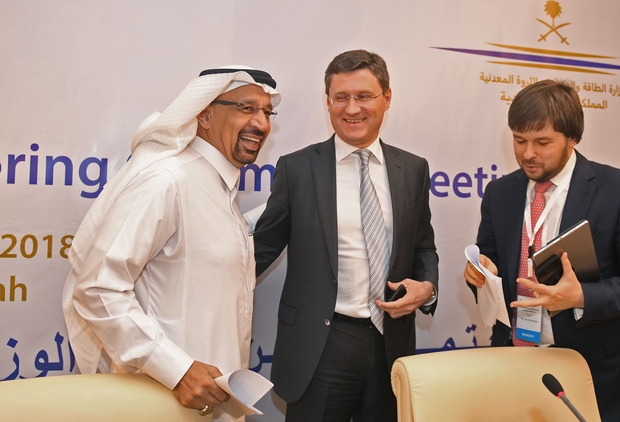
WASHINGTON: US President Donald Trump slammed Opec for inflating oil prices after the cartel showed a willingness to further tighten crude markets.
“Looks like Opec is at it again,” Trump said on Twitter, not long after energy ministers finished their meeting in Jeddah, Saudi Arabia. “Oil prices are artificially Very High! No good and will not be accepted!”
The president’s outburst followed a stream of bullish signals from a meeting of oil producers in Saudi Arabia, chiefly from Energy Minister Khalid Al-Falih. The crude glut that has weighed on prices for three years has almost been wiped out by Opec’s production cuts, but instead of celebrating victory the group is finding reasons to keep going and drive fuel inventories even lower.
Brent crude, the international benchmark, fell 69 cents at the time of Trump's tweet, before trading down 0.8% at $73.17 a barrel in London on Friday.
The purpose of the shift in Opec’s target was clear: There is capacity for prices to rise even further beyond their current three-year high, Al-Falih said.
“We have seen prices significantly higher in the past, twice as much as where we are today” and the global economy has the ability to absorb costlier crude, the Saudi minister said.
International oil prices have surged to almost $75 a barrel and US gasoline is the highest in almost three years. Yet Opec’s choke-hold on its own production is only getting tighter. Saudi Arabia is said to desire crude closer to $80.
The closest US allies within the Organization of Petroleum Exporting Countries rejected Trump’s accusation. Prices are not artificially high, said United Arab Emirates Oil Minister Suhail Al Mazrouei.
“We are doing our role to correct the market,” Al Mazrouei said. “There are many things affecting the market, not just supply and demand,” including geopolitics that are beyond Opec’s control, he said.
Russia, Saudi Arabia’s most important ally in the production cuts, gave its backing to continuing the cuts until their end-2018 expiry. There is no obligation to stop just because the pact’s initial goal -- stockpiles in industrialised nations back in line with the five-year average -- is at hand, said Energy Minister Alexander Novak.
Novak also rejected Trump’s accusation, while also arguing the group’s production cuts have helped US producers to boost output. "The deal helped to restore the industry of Texas," he said in an interview with Bloomberg Television.
Soaring US shale production has been a nagging concern for Opec and its allies, but the group’s key players appear to be more fixated on the immediate benefits of high crude prices.
Saudi Arabia needs to cover weighty domestic spending and attract investors to a partial sale of its state oil company, Aramco. Russia is relishing its new role as a major Middle East power broker, while also enjoying bigger financial gains than anyone from the accord.
“Russia is keeping all options open and Saudi Arabia is talking about a 2019 extension,” UBS analyst Giovanni Staunovo said.
Overall, Opec and its allies cut 49% more than their agreed 1.8 million barrels a day in March. That’s the biggest reduction ever and the seventh month the group has surpassed its target, Novak said.
Much of those additional reductions weren’t intentional, according to the International Energy Agency. An economic crisis and “chronic mismanagement” dragged Venezuela’s output to a multi-decade low, while Angola lost production from ageing fields. The involuntary cuts may keep getting deeper if Trump reimposes sanctions on Iran next month.
Ministers seemed to embrace the notion of a significantly tighter oil market. Saudi Arabia in particular gave a strong indication that higher prices wouldn’t be a bad thing. Every year the world needs to develop new daily production capacity of about 4 million to 5 million barrels and invest hundreds of billions of dollars, but that’s not happening right now, Al-Falih said.